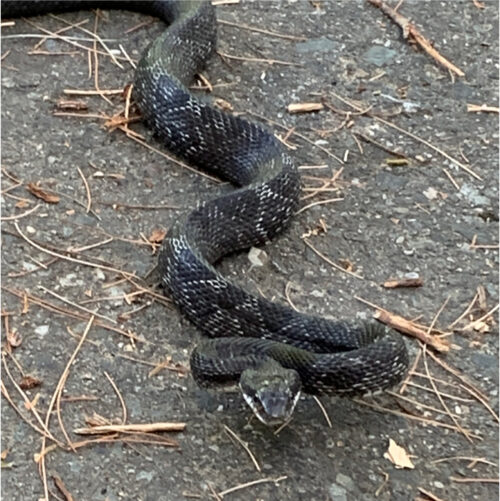There Is a Snake in My Yard!
Snakes like all animals go where there is a safe place to live and has a good food source. For snakes, finding a home where there are places to hide and mice to eat is ideal. So if your property has a lot of prey, like mice, you will have a lot of snakes.
If you believe you might have snakes take a walk around your property, carefully. Check for overgrown shrubs, thick leaves, woodpiles, and areas where a snake might find a cozy hiding spot. Keep in mind there will be cooler days where a snake may come out for warmth and sunshine during the cooler days.
When Are Snakes Most Active?
Snake activity picks up in late summer and early autumn when the temperatures start to fall. This is the period before they go into hibernation, and is when they are most active looking for food. However, this period can extend from early September or as late as December depending on the climate for the year. Snakes will spend January through April in a type of hibernation called brumation
Since snakes are cold-blooded animals, they become less active in the cooler months. During winter, snakes and other reptiles will enter brumation. Brumation is similar to hibernation but requires less sleep. Due to this, snakes can be active during the winter months, especially on warmer days. You will need to be cautious during these months as well. During the summer, snakes can be found basking in the sun, during winter.
Why Shouldn’t I Grab the Snake Myself?
Why cant I grab the snake myself? Is a good question, but there are a few reasons why you shouldn’t. Snake bites, even from the harmless snakes can cause allergic reactions or infections. Which means even if you got bit by a non-venomous snake it is still highly recommended to go to the hospital. Those are just the non-venomous snakes!
Of the 33 species of snakes in Florida, 8 are venomous: The Southern Pacific Rattlesnake, the Northern Pacific Rattlesnake, the Great Basin Rattlesnake, the Western Diamondback, the Red Diamondback, the Sidewinder, the Speckled Rattlesnake, and the Mojave Green Rattlesnake. If you are bit by any snake, do these steps as listed by the CDC:
- If you or someone you know are bitten, try to see and remember the color and shape of the snake, which can help with treatment of the snake bite.
- Keep the bitten person still and calm. This can slow down the spread of venom if the snake is venomous.
- Seek medical attention as soon as possible.
- Dial 911 or call local Emergency Medical Services (EMS).
- Apply first aid if you cannot get the person to the hospital right away.
Do not take the risk of grabbing the snake yourself. Please give us a call as we are trained professionals and know about the snakes in North Port.


